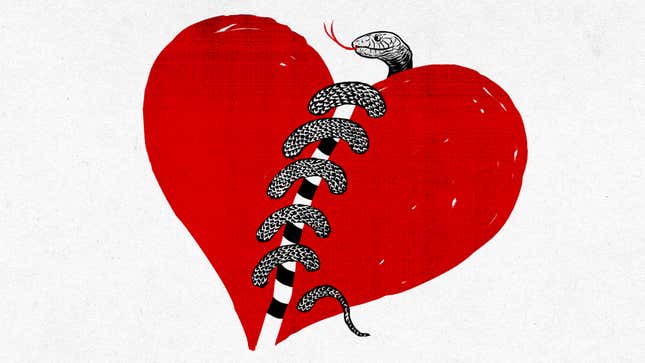Your Relationship Is Only As Good as the Lies Holding it Together
Latest

If lies are not the glue that binds us, then they are at least the sticky tape. This isn’t only true just for us overly sensitive beings who can’t face being told what we’re really like, but also for lovers who can’t stand knowing what our significant others are really thinking (about us). In this arena, some argue lies are essential to happiness.
Or so goes a theory in a Sunday opinion piece at the New York Times from Clancy Martin, a professor of philosophy who has written a book about the inextricable link between deception and romance called Love and Lies. Martin opines that we’re all chronic liars: We lie two or three times every 10 minutes during normal chit-chat, he says, but we save our biggest, best, most fantastical lies for the people we love the most. We do this for the same reason we’ve always been lying: Because we are afraid, and because we care.
This is a deeply rooted thing that goes all the way back to childhood, when you cared about other kids’ approval, when you feared losing your parents’ love so you lied to keep it. You would think that with romantic love it might be different. After all, doesn’t really loving someone make you want to tell them the truth? And isn’t it easier to tell someone you genuinely love the truth because you really do love them, therefore, all the sweet nothings aren’t a load of shit?
Not really. And this shouldn’t really come as a surprise, Martin writes, unless you’re pretty naive:
The people who find themselves most betrayed by the lies of lovers are those who have the most unrealistic expectations about truthfulness. And the people who are most inclined to believe the lies they shouldn’t are the ones who tell themselves the biggest lie of them all: “I never tell lies.”
This means that in order to not find yourself betrayed by the lies of lovers—at least not to any extreme degree—you would need to expect to be lied to. You need to be well aware of your own lies, and therefore less shocked by the lies of your mate.
Of course you’re not the best lover he’s ever had. Hell no, you don’t really make a mean lasagna. Of course she’s not the only person who has ever really understood you. Of course you don’t actually make each other the happiest you’ve ever been—er, wait. Now I’m confused. How deep do all these lies go? At some point, I’m thinking that the need for a lot of lies is probably a bad sign.
And herein lies the rub: Of course we all lie to our loved ones at some point or another. But ideally, the better a relationship is, the more it could withstand a little honesty, and the less lies would even be necessary. Right? Because when you genuinely admire and like someone, there’s a lot of good truth to spread around. And you could always go out of your way to say what’s true and real, and cultivate a more genuine sort of rapport.
Also, it depends on the type of lies you’re talking about.
Good lie: You both don’t admit that you fantasize about other people during sex because you know it needlessly hurts the other person’s feelings. But you can both assume the other person does it; therefore, if you find out the other person does it, there is no point in being deeply betrayed by that which you can assume is true, and that which you are guilty of, too, which doesn’t threaten the relationship’s core values.
-

-

-

-

-

-

-

-

-

-

-

-

-

-

-

-

-

-

-

-

-

-

-

-

-

-

-

-

-

-

-

-

-

-

-

-

-

-

-

-








































